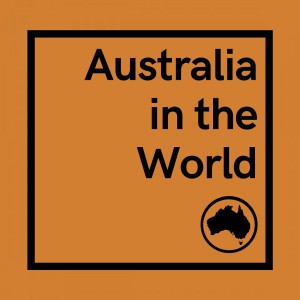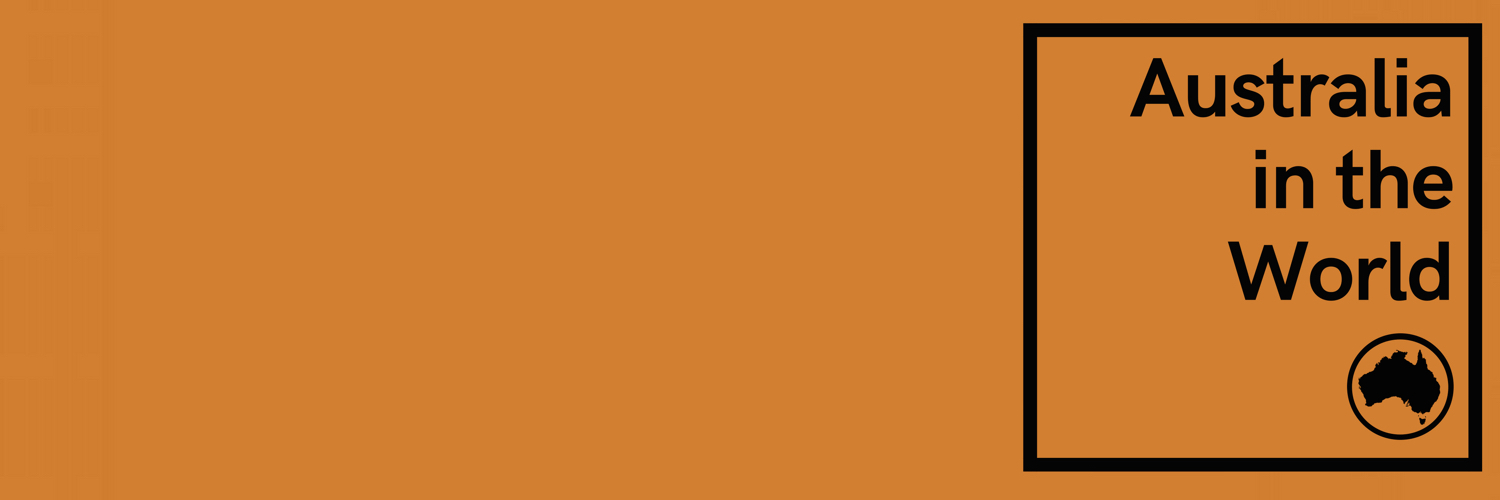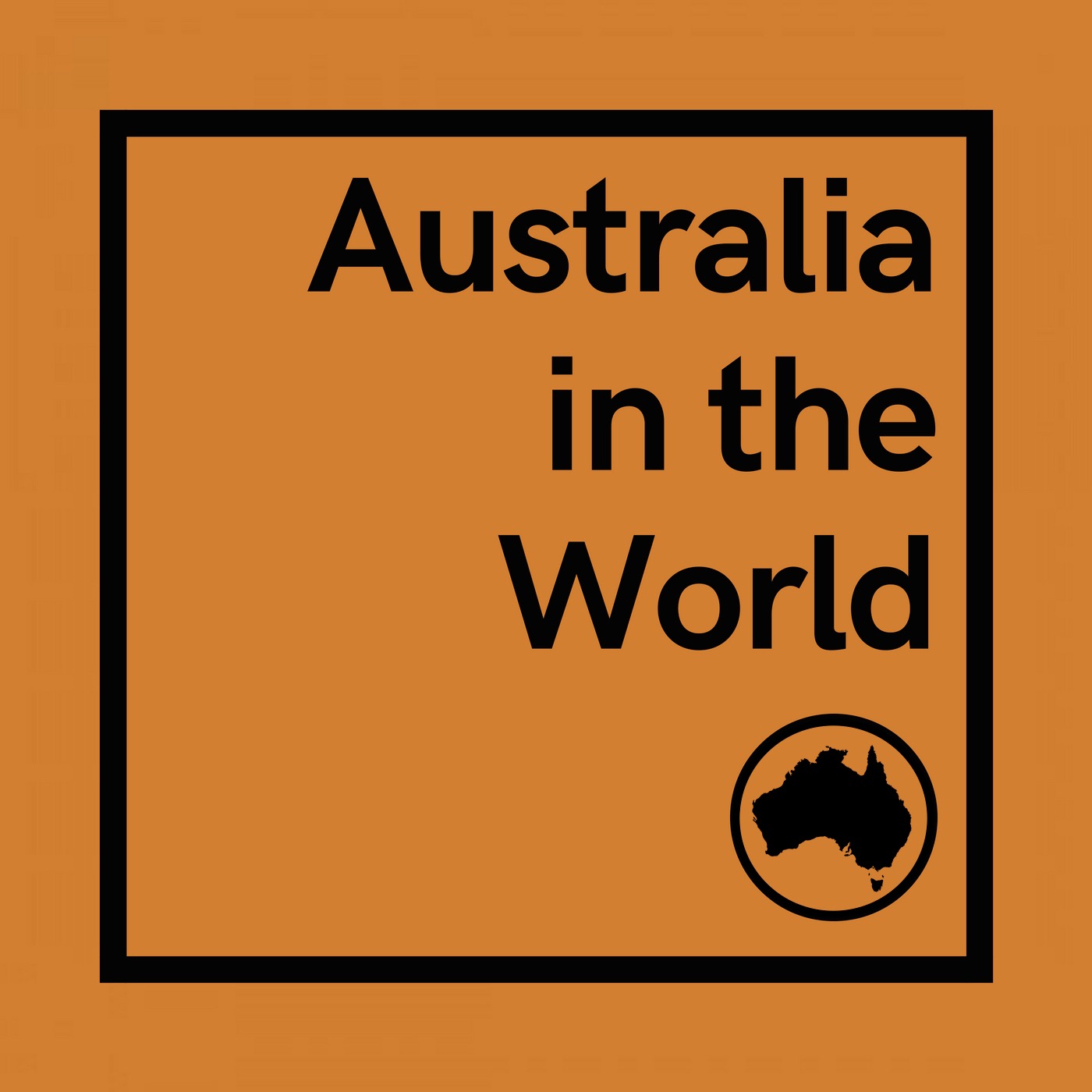Episodes

Wednesday Sep 20, 2023
Ep. 116: Australia’s international development policy
Wednesday Sep 20, 2023
Wednesday Sep 20, 2023
The Australian government has launched a new International Development Policy, and Darren is joined by Bridi Rice, CEO of the Development Intelligence Lab, for a discussion of all things development through an Australian lens. The conversation begins with some Development 101: what is “development? What are the goals of development policy and are they contested? How is development policy carried out in practice, and by whom? Bridi describes Australia’s development policy community as coming out of a decade in a “defensive crouch” and provides an overview of the new policy. The conversation ranges widely, including a focus on geopolitics and China and the question of how a development policy can place a climate change agenda at its core.
Australia in the World is written, hosted and produced by Darren Lim, with research and editing by Corbin Duncan and theme music composed by Rory Stenning.
Relevant links
Bridi Rice, biography: https://www.devintelligencelab.com/team/bridi-rice
Department of Foreign Affairs and Trade, “Australia’s International Development Policy”, August 2023: https://www.dfat.gov.au/development/new-international-development-policy
Eryk Bagshaw, “Ransom attack cripples Vanuatu government systems, forces staff to use pen and paper”, Sydney Morning Herald, 14 November 2022: https://www.smh.com.au/world/oceania/australia-called-in-to-help-after-hackers-shut-down-vanuatu-government-systems-20221114-p5by7a.html
Pat Conroy, Audience Q&A, Development Policy Forum, Australian National University, 12 September 2023: https://ministers.dfat.gov.au/minister/pat-conroy/transcript/audience-qa-development-policy-forum-australian-national-university
Stefan Dercon, Gambling on Development: Why Some Countries Win and Others Lose (2022): https://www.amazon.com/Gambling-Development-Some-Countries-Others/dp/1787385620
Gambling on development, reviewed: https://blogs.lse.ac.uk/lsereviewofbooks/2022/09/14/book-review-gambling-on-development-why-some-countries-win-and-others-lose-by-stefan-dercon/
Gambling on development, presented to an Australian audience at ANU: https://www.youtube.com/watch?v=w3mNwbNDoPg
Hania Rani (musician and composer): https://haniarani.com
Bluey The Album: https://www.bluey.tv/products/bluey-the-album/

Tuesday Aug 22, 2023
Ep. 115: The domestic politics of AUKUS and Pacific security pacts
Tuesday Aug 22, 2023
Tuesday Aug 22, 2023
This episode Darren is thrilled to be joined (for the second time) by Stephen Dziedzic of the ABC, perhaps the finest foreign affairs reporter in Australia and a dear friend of the podcast. While the episode commences with the premise of ‘stories that are bubbling beneath the surface’, over time a clear theme emerges – the domestic politics of security pacts. The conversation begins with a new agreement between Papua New Guinea and the United States that seems to be delaying Canberra’s efforts to conclude its own pact with Port Morseby. Next up is Vanuatu, where Australia was (surprisingly) able to procure the signing of a new security agreement when a new government took office last year, but which is now facing strong ratification headwinds. Meanwhile in Australia, grassroots discontent within the ruling Labor Party regarding AUKUS threatened to overflow at the party’s annual conference this past week. The majority of the podcast was recorded on 11 August, with a quick postscript recorded on 20 August.
Australia in the World is written, hosted and produced by Darren Lim, with research and editing by Walter Colnaghi and theme music composed by Rory Stenning.
Relevant links
Kenneth Clarke, Civilisation (TV series): https://www.youtube.com/watch?v=sX_r9R98DiY
Empire (podcast): https://www.goalhangerpodcasts.com/battleground-copy
China Power (podcast), ‘China’s Influence in Melanesia: A Conversation with Pete Connolly’, 2 August 2023: https://www.csis.org/podcasts/chinapower/chinas-influence-melanesia-conversation-pete-connolly
Richard Kerbaj, The Secret History of the Five Eyes: The Untold Story of the International Spy Network (review): https://www.theguardian.com/books/2022/oct/02/the-secret-history-of-the-five-eyes-untold-story-international-spy-network-by-richard-kerbaj-review
Henry Reynolds, Truth-Telling: History, sovereignty and the Uluru Statement, NewSouth Books: https://www.newsouthbooks.com.au/books/truth-telling/

Tuesday Aug 08, 2023
Ep. 114: And we’re back. Australia-China; US-China
Tuesday Aug 08, 2023
Tuesday Aug 08, 2023
It’s time to resume, or start again. A lot has happened in the past four months, and Darren focuses on two big stories, or relationship trajectories: Australia-China, and US-China. Both might be trending in positive directions, but there have been bumps along the way.
May the same be said for this podcast into the future!
Australia in the World is written and produced by Darren Lim, with research, editing and co-hosting this episode by Walter Colnaghi, and theme music composed by Rory Stenning.
Relevant links
Penny Wong, “Meeting with China’s Director of the Office of the Central Commission for Foreign Affairs Wang Yi - Opening remarks”, 13 July 2023: https://www.foreignminister.gov.au/minister/penny-wong/speech/meeting-chinas-director-office-central-commission-foreign-affairs-wang-yi-opening-remarks
Alan Tidwell, “The role of ‘diplomatic lobbying’ in shaping US foreign policy and its effects on the Australia–US relationship”, Australian Journal of International Affairs, 2017: https://www.tandfonline.com/doi/full/10.1080/10357718.2016.1184620
Celebrating the Life of Allan Gyngell AO, 19 June 1947 - 3 May 2023 (video): https://www.youtube.com/watch?v=ej7i_0bqVNM
Leonard Cohen, “Come healing”: https://www.youtube.com/watch?v=8pKUwTooZ3o
DPM Richard Marles’ statement ot the House of Representatives, 10 May 2023: https://www.aph.gov.au/Parliamentary_Business/Hansard/Hansard_Display?bid=chamber/hansardr/26693/&sid=0002
Video (see from 9:01:20am): https://www.aph.gov.au/News_and_Events/Watch_Read_Listen/ParlView/video/1108170
FM Penny Wong’s statement to the Senate, 10 May 2023: https://www.aph.gov.au/Parliamentary_Business/Hansard/Hansard_Display?bid=chamber/hansards/26728/&sid=0055
Video (see from 12:19:40): https://www.aph.gov.au/News_and_Events/Watch_Read_Listen/ParlView/video/1108162
Tim Watts, “Remarks in memory of Allan Gyngell AO”, 11 May 2023: https://ministers.dfat.gov.au/minister/tim-watts/statements/remarks-memory-allan-gyngell-ao
Alan Bollard, Economists at war (book): https://global.oup.com/academic/product/economists-at-war-9780198846000?cc=au&lang=en&
Rick Astley and Blossoms perform the songs of The Smiths at Glastonbury 2023 (youtube, but audio only): https://www.youtube.com/watch?v=GJ6KiHIWnFk

Saturday May 06, 2023
Allan Gyngell and Australia in the world
Saturday May 06, 2023
Saturday May 06, 2023
Allan Gyngell passed away on 3 May 2023. Darren talks about the past few weeks, and reads a short piece he wrote for the AIIA about his friend, and the podcast they built together.
Relevant links
Darren Lim, “Allan Gyngell and ‘Australia in the World’”, 5 May 2023: https://www.internationalaffairs.org.au/australianoutlook/allan-gyngell-and-australia-in-the-world/
Penny Wong, “Passing of Allan Gyngell AO”, 3 May 2023: https://www.foreignminister.gov.au/minister/penny-wong/media-release/passing-allan-gyngell-ao
Daniel Flitton, “Remembering Allan Gyngell, ‘the finest mind in Australian foreign policy’”, Lowy Interpreter, 3 May 2023: https://www.lowyinstitute.org/the-interpreter/remembering-allan-gyngell-finest-mind-australian-foreign-policy
Andrew Tillett, “Allan Gyngell remembered as ‘finest mind’ in foreign policy”, Australian Financial Review, 3 May 2023: https://www.afr.com/politics/federal/allan-gyngell-remembered-as-finest-mind-in-foreign-policy-20230503-p5d599
Peter Varghese, “Vale Allan Gyngell AO”, Asialink, 3 May 2023: https://asialink.unimelb.edu.au/stories/vale-allan-gyngell-ao
John Blaxland, “Vale Allan Gyngell: A remarkable contributor to Australia’s engagement with the world”, The Conversation, 4 May 2023: https://www.themandarin.com.au/219276-allan-gyngell-a-contributor-to-australias-world-engagement/
Kevin Rudd, “Statement on the death of Allan Gyngell AO”, 3 May 2023: https://www.kevinrudd.com/media/statement-on-the-death-of-allan-gyngell-ao
Ludovico Einaudi, i giorni (youtube): https://www.youtube.com/watch?v=TL1v3KVi6go
George Winston, Variations on the Kanon (youtube): https://www.youtube.com/watch?v=x2CE5BZVk40

Tuesday Apr 04, 2023
Ep. 112: Cold War 2?
Tuesday Apr 04, 2023
Tuesday Apr 04, 2023
In the wake of Xi Jinping’s trip to Moscow to meet Vladimir Putin, Allan and Darren ask – are we in a new Cold War? Is the concept a useful frame for understanding international affairs?
We thank Walter Colnaghi for research and audio editing and Rory Stenning for composing our theme music.
Relevant links
“Dr Heather Smith to become National President of the Australian Institute of International Affairs”, AIIA Press release, 17 November 2022: https://www.internationalaffairs.org.au/news-item/dr-heather-smith-to-become-national-president-of-the-australian-institute-of-international-affairs/
George Orwell, “You and the atom bomb”, 1945: https://www.orwellfoundation.com/the-orwell-foundation/orwell/essays-and-other-works/you-and-the-atom-bomb/
Aaron Friedberg, “Why didn’t the United States become a Garrison State” (article): https://www.jstor.org/stable/2539189
Aaron Friedberg, In the shadow of the Garrison State (book): https://press.princeton.edu/books/paperback/9780691048901/in-the-shadow-of-the-garrison-state
“ChinaTalk: Stephen Kotkin on China” (podcast), 23 March 2023: https://www.lawfareblog.com/chinatalk-stephen-kotkin-china
George Kennan, “The long telegram” (1946): https://nsarchive2.gwu.edu/coldwar/documents/episode-1/kennan.htm
“Speech by President von der Leyen on EU-China relations to the Mercator Institute for China Studies and the European Policy Centre”, 30 March 2023: https://ec.europa.eu/commission/presscorner/detail/en/speech_23_2063
John Lewis Gaddis, The Long Peace (book): https://global.oup.com/academic/product/the-long-peace-9780195043358?cc=au&lang=en&
Odd Arne Westad, The Global Cold War (book): https://www.cambridge.org/core/books/global-cold-war/75870878657DC67E0BC70FA7D2388494
Darren Lim and John Ikenberry, “China and the logic of illiberal hegemony”, Security Studies (temporary free download): https://www.tandfonline.com/eprint/HGZEHMIG6URDFUCTYCCN/full?target=10.1080/09636412.2023.2178963
Darren Lim and John Ikenberry, “China and the logic of illiberal hegemony”, Ungated paper: https://papers.ssrn.com/sol3/papers.cfm?abstract_id=4244377
John Lewis Gaddis, George F Kennan: An American Life (book): https://www.pulitzer.org/winners/john-lewis-gaddis
Norah Jones (Wikipedia page): https://en.wikipedia.org/wiki/Norah_Jones

Sunday Mar 19, 2023
Ep. 111: AUKUS plans; India; red alerts
Sunday Mar 19, 2023
Sunday Mar 19, 2023
The members of AUKUS have laid out a more concrete plan for Australia to acquire a nuclear-powered submarine capability, and so Allan and Darren offer their views on progress to date, the merits of the overall plan, and what might be ahead. Next, following PM Albanese’s state visit to India, the two discuss the significance of the visit for the bilateral relationship, the two countries’ respective interests, and some of the challenges (such as human rights) in further deepening ties. Finally, they each offer their thoughts on the “Red Alert” series on the prospect of war with China published by Nine Newspapers.
We thank Walter Colnaghi for research and audio editing and Rory Stenning for composing our theme music.
Relevant links
Joint leaders statement on AUKUS, 14 March 2023: https://www.pm.gov.au/media/joint-leaders-statement-aukus
Brett Worthington, “Paul Keating savages AUKUS nuclear submarine deal as Labor's worst since conscription”, ABC News, 15 March 2023: https://www.abc.net.au/news/2023-03-15/paul-keating-anthony-albanese-penny-wong-aukus-nuclear-china/102098142
Roger Bradbury et al, “Progress in detection tech could render submarines useless by the 2050s. What does it mean for the AUKUS pact?”, The Conversation, 14 March 2023: https://theconversation.com/progress-in-detection-tech-could-render-submarines-useless-by-the-2050s-what-does-it-mean-for-the-aukus-pact-201187
Peter Varghese, “The balance sheet of the nuclear subs deal”, Australian Financial Review, 16 March 2023: https://www.afr.com/policy/foreign-affairs/the-balance-sheet-of-the-nuclear-subs-deal-20230315-p5csgi
Laura Tingle, “Paul Keating can be his own worst enemy but his AUKUS spray raises big questions about China, defence, that have slipped us by”, ABC News, 18 March 2023: https://www.abc.net.au/news/2023-03-18/paul-keating-savage-mouth-aukus-questions-china-defence-slipping/102113150
“Is AUKUS flawed by design?” Net Assessment Podcast, 15 March 2023: https://warontherocks.com/2023/03/is-aukus-flawed-by-design/
Joint Statement – 1st Australia-India Annual Summit, 11 March 2023: https://www.pm.gov.au/media/joint-statement-1st-australia-india-annual-summit
Peter Hartcher and Matthew Knott, “Red Alert”, Sydney Morning Herald: https://www.smh.com.au/politics/federal/red-alert-20230306-p5cpt8.html
Margaret Simons, “‘Pretentious’, ‘hyperbolic’ and ‘irresponsible’: what was behind Nine newspapers’ Red Alert series?”, Guaridan Australia, 17 March 2023: https://www.theguardian.com/australia-news/2023/mar/16/pretentious-hyperbolic-and-irresponsible-what-was-behind-nine-newspapers-red-alert-series
Max Seddon, Christopher Miller and Felicia Schwartz, “How Putin blundered into Ukraine — then doubled down”, Financial Times, 23 February 2023: https://www.ft.com/content/80002564-33e8-48fb-b734-44810afb7a49
Come From Away (musical): https://comefromaway.com.au/

Thursday Feb 23, 2023
Ep. 110: Ukraine, one year on
Thursday Feb 23, 2023
Thursday Feb 23, 2023
Marking one year since Russia’s invasion of Ukraine, Allan and Darren reflect on what they have learned, what surprised them, and how they each are thinking about the path ahead.
We thank Walter Colnaghi for research and audio editing and Rory Stenning for composing our theme music.
Relevant links
“Ukrainian foreign minister responds to Amanpour's 'painful' question about war” (video), CNN, 21 February 2023: https://www.youtube.com/watch?v=tShC67Xp8m8
Olga Oliker, “Fighting While Female: How Gender Dynamics Are Shaping the War in Ukraine”, Foreign Affairs, 21 November 2022: https://www.foreignaffairs.com/ukraine/fighting-while-female
Dominic Johnson et al, “Overconfidence in wargames: experimental evidence on expectations, aggression, gender and testosterone”, Proceedings of the Royal Society B, Vol. 273, pp. 2513-2520: https://royalsocietypublishing.org/doi/10.1098/rspb.2006.3606
China Matters Oration by the Hon Dr Kevin Rudd AC (video), 18 February 2023: https://www.youtube.com/watch?v=5rlrkT8BXlg
George Winston, “Summer” (1991): https://en.wikipedia.org/wiki/Summer_(George_Winston_album)
Agathe Demarais, Backfire: How Sanctions Reshape the World Against U.S. Interests (Columbia University Press, 2022): http://cup.columbia.edu/book/backfire/9780231199902

Saturday Feb 11, 2023
Ep. 109: Balloons; FM’s UK speech; France 2+2; DM on sovereignty
Saturday Feb 11, 2023
Saturday Feb 11, 2023
The “Chinese spy balloon” has dominated news for the past few weeks and thus Allan and Darren feel compelled to open the episode with their views. FM Penny Wong’s speech in the UK sparked controversy for her comments on colonial history, or did it? Meanwhile, a successful 2+2 with France highlighted how far the relationship has come since a low point in late 2020. DM Richard Marles spoke to parliament on the question of sovereignty and defence capabilities, while International Development Minister Pat Conroy wants to see more development specialists in leadership roles at DFAT.
We thank Walter Colnaghi for research and audio editing and Rory Stenning for composing our theme music.
Relevant links
“Chinese balloon part of vast aerial surveillance program, U.S. says”, Washington Post, 7 February 2023: https://www.washingtonpost.com/national-security/2023/02/07/china-spy-balloon-intelligence/
Penny Wong, “TV interview with Michael Rowland, ABC News Breakfast”, 6 February 2023: https://www.foreignminister.gov.au/minister/penny-wong/transcript/tv-interview-michael-rowland-abc-news-breakfast
Penny Wong, “An enduring partnership in an era of change”, Speech, Centre for Grand Strategy, King's College, London, 31 January 2023: https://www.foreignminister.gov.au/minister/penny-wong/speech/enduring-partnership-era-change
Hans van Leeuwen, “Why Wong got a walloping in Britain this week”, Australian Financial Review, 3 February 2023: https://www.afr.com/policy/foreign-affairs/why-penny-got-a-pounding-in-britain-this-week-20230203-p5chne
Richard Marles, “Securing Australia’s Sovereignty”, Statement to Parliament, 9 February 2023: https://www.minister.defence.gov.au/statements/2023-02-09/securing-australias-sovereignty
Matthew Knot, “‘AUKUS will enhance sovereignty’: Marles dismisses Keating, Turnbull concerns”, Sydney Morning Herald, 8 February 2023: https://www.smh.com.au/politics/federal/aukus-will-enhance-sovereignty-marles-dismisses-keating-turnbull-concerns-20230208-p5cj1q.html
Stephen Dziedzic, “International Development Minister Pat Conroy wants AusAID to regain prominence within DFAT”, ABC News, 9 February 2023: https://www.abc.net.au/news/2023-02-09/pat-conroy-dfat-wants-development-specialists-ausaid-/101951876
“Anthony Albanese on navigating an insecure world”, Guardian Australia, Australian Politics Podcast, 4 February 2023: https://www.theguardian.com/australia-news/audio/2023/feb/04/anthony-albanese-on-navigating-an-insecure-world
(Podcast Transcript: https://www.pm.gov.au/media/podcast-interview-guardian-australia-politics-podcast )
Annie Ernaux, “The years” (book): https://www.penguin.com.au/books/the-years-9781609807870
Jim Chalmers, “Capitalism after the crisis”, The Monthly, February 2023: https://www.themonthly.com.au/issue/2023/february/jim-chalmers/capitalism-after-crises#mtr
Noah Smith, “Vertical communities”, Noahpinion (substack), 27 January 2023: https://noahpinion.substack.com/p/vertical-communities

Friday Jan 20, 2023
Ep. 108: PM in PNG; duelling ambassadors; reviewing 2022
Friday Jan 20, 2023
Friday Jan 20, 2023
To kick off 2023, Allan and Darren continue their practice of asking how the events of previous year caused them to update their models of international affairs. But first they discuss PM Albanese's visit to Papua New Guinea and speech to the PNG parliament, and also a curious spat between the ambassadors to Australia from China and Japan, which leads to a larger discussion of different models of ambassador, and what a “Rudd model” might look like now that former PM Kevin Rudd has been named Australia’s next ambassador to the United States.
We thank Walter Colnaghi for research and audio editing and Rory Stenning for composing our theme music.
Relevant links
Anthony Albanese, “A bond between equals”, Speech to the National Parliament of Papua New Guinea, 12 Jan 2023: https://www.pm.gov.au/media/bond-between-equals
Press conference – Port Moresby, PNG and Australian PMs, 12 Jan 2023: https://www.pm.gov.au/media/press-conference-port-moresby
Matthew Knot, “Taiwan cannot be sacrificed to China, says Japan’s ambassador to Australia”, Sydney Morning Herald, 12 Jan 2023: https://www.smh.com.au/politics/federal/taiwan-cannot-be-sacrificed-to-china-says-japan-s-ambassador-to-australia-20230112-p5cc30.html
Embassy of Japan in Australia, Ambassador’s speeches, media contributions, interviews: https://www.au.emb-japan.go.jp/itpr_en/ambassador_media_speech.html
Tyson Yunkaporta. Sand Talk: How Indigenous Thinking Can Save the World, Text publishing: https://www.textpublishing.com.au/books/sand-talk
14 Peaks: Nothing is impossible (Netflix): https://www.netflix.com/au/title/81464765
Free solo (Disney Plus): https://films.nationalgeographic.com/free-solo

Tuesday Dec 20, 2022
Ep. 107: Assistant Foreign Minister Tim Watts
Tuesday Dec 20, 2022
Tuesday Dec 20, 2022
Allan and Darren welcome Tim Watts MP, Assistant Minister for Foreign Affairs.
This is a new role—what does it involve, and how does it contribute to the current global ‘race for influence’? On a personal level, what has the transition into government been like?
Given the centrality placed by the Albanese government on identity in Australia’s foreign policy, Darren asks the Minister for his perspective on why it matters. The discussion turns to soft power and the moment when newly elected MP Sam Lim’s first speech to parliament went viral in Malaysia.
The conversation then ranges widely. What did the Minister learn on the balance between regional and global during recent trips to South America and Africa? What is needed to upgrade Australia’s “diplomatic fire power”? The point is made that video production skills might be as important as cable writing skills for the modern diplomat! What ideas should Australia be persuading the region about? What does the Minister’s diverse and multicultural electorate think of his job? Does foreign policy have a role in strengthening democracy? And how has the Labor government managed to present a unified position on foreign policy so far? Finally, how does the Minister inform himself beyond what comes through government channels?
Relevant links
Tim Watts, ‘The Golden Country: Australia’s Changing Identity’, 2019: https://www.textpublishing.com.au/books/the-golden-country-australia-s-changing-identity
Clare O’Neil and Tim Watts, ‘Two Futures: Australia at a Critical Moment’, 2015: https://www.textpublishing.com.au/books/two-futures
Penny Wong, ‘Special lecture to the International Institute for Strategic Studies - A shared future: Australia, ASEAN and Southeast Asia’, Singapore, 6 July 2022: https://www.foreignminister.gov.au/minister/penny-wong/speech/special-lecture-international-institute-strategic-studies-shared-future-australia-asean-and-southeast-asia
Tim Watts, 'Asialink Leaders Summit opening keynote - Australia’s place in Asia’, Canberra, 16 August 2022: https://ministers.dfat.gov.au/minister/tim-watts/speech/asialink-leaders-summit-opening-keynote-australias-place-asia
Joseph S. Nye, ‘Soft Power: The Means to Success in World Politics’, 2005: https://www.publicaffairsbooks.com/titles/joseph-s-nye/soft-power/9780786738960/
Sam Lim, ‘First Speech to Parliament’, Canberra, 6 September 2022: https://parlview.aph.gov.au/mediaPlayer.php?videoID=588997&operation_mode=parlview
Sally Sitou, ‘First Speech to Parliament’, Canberra, 26 July 2022: https://parlview.aph.gov.au/mediaPlayer.php?videoID=584964
Tim Watts, ‘First Speech to Parliament’, Canberra, 2 December 2013: https://parlview.aph.gov.au/mediaPlayer.php?videoID=212795#/4
National Intelligence Council, ‘Global Trends 2040: A More Contested World’, March 2021: https://www.dni.gov/files/ODNI/documents/assessments/GlobalTrends_2040.pdf
Clare O’Neil, ‘Home Affairs and the long view - National Press Club Address’, Canberra, 8 December 2022: https://minister.homeaffairs.gov.au/ClareONeil/Pages/national-press-club-address.aspx
Dimitri Alperovitch, ‘Geopolitics Decanted’: https://geopolitics-decanted.simplecast.com/
Damon Gadget, ‘The Promise’, 2022: https://www.penguin.com.au/books/the-promise-9781529113877
Kabir Khan, ’83’, 2021: https://www.netflix.com/title/81144147

